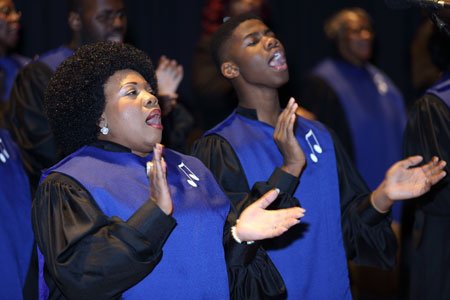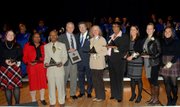BALTIMORE — When it comes to celebrating and remembering Dr. Martin Luther King, Jr., the Johns Hopkins community certainly counts among those who routinely capture the legacy of the late civil rights icon. On Friday, January 9, 2015, a standing-room only crowd in the Turner Auditorium celebrated Dr. King’s life and legacy at the 33rd annual commemoration of his journey with song, speeches and an awards ceremony.
(Left to right) Community Service Award Winners Margaret Strong; Rochelle Mariano; Nelson Moody Sr.; keynote speaker Morris Dees, founder of the Poverty Law Center; Dr. Levi Watkins Jr. retired Johns Hopkins University professor and founder of the Annual Martin Luther King Jr. Commemoration; and Community Service Award Winners Janine Coy; Harlisha Martin; Theresa Barberi; Danielle Chi (wife of Dr. Albert Chi, who accepted the award on his behalf because of his deployment); and Adi Noiman at the 33rd Annual Martin Luther King, Jr. Commemoration at Johns Hopkins Medicine’s Turner Auditorium on Friday, January 9, 2015.
The two-hour event also paid tribute to the late Maya Angelou.
“It’s pretty heavy in here right now,” said Dr. Levi Watkins, Jr., the commemoration’s founder and retired Johns Hopkins University professor.
The celebration kicked off in earnest with “Unified Voices,” a volunteer gospel choir of Baltimore community members and Johns Hopkins faculty, staff and students, performing a bevy of civil rights-related songs, including “Oh Happy Day,” and the Black National Anthem, “Lift Every Voice and Sing.”
“The march for justice continues,” said Morris Dees, the keynote speaker of the event and the founder of the Southern Poverty Law Center.
Dees, 78, spoke with fervor about tolerance and the challenges that America still faces, particularly in the aftermath of several controversial and highly-charged police incidents including the Michael Brown shooting in Ferguson, Missouri and the Eric Garner chokehold death in New York. “This nation is great because of our diversity, not in spite of it.”
The son of cotton farmers in Alabama, Dees witnessed firsthand social and economic deprivation, along with Jim Crow laws at their worst, according to his biography provided by officials at Johns Hopkins Hospital.
In 1970, he founded the Southern Poverty Law Center and in 1980, the center founded the Intelligence Project in response to the resurgence of organized racist activity, he said.
The project monitors hate groups and develops legal strategies for protecting citizens from violence-prone groups. In 1991, Dees and the Intelligence Project won a $7 million precedent-setting judgment against the United Klans of America on behalf of the mother of a young black man lynched by the Ku Klux Klan in Mobile, Alabama.
Other victories against hate groups include a $6 million judgment that bankrupted the Aryan Nation, a $12.5 million verdict against the California-based White Aryan Resistance for the death of a black student and a $26 million verdict against the Klan for burning black churches.
“Our march for justice didn’t end with the Voting Rights Act of 1965,” Dees said. “It continues today.”
In introducing Dees, Dr. Watkins called the activist “one of the biggest challengers to extremism.” And, Dees himself helped to underscore that as he encouraged the overflow crowd to carry on King’s commitment to human rights and social justice.
“We must not stop, there’s much to be done,” he said. “We see so much division now in this nation. Mass incarceration is a major issue we must deal with and we have the problem of how to determine how we stop racial profiling in this country.”
“There are lonely pockets of poverty and injustice in America,” Dees said quoting King. “There are those who are not finding opportunity for justice. Today, that continues.”
Dees’ speech was met by a standing ovation. The celebration also included addresses by Ronald J. Daniels, president of The Johns Hopkins University; Paul B. Rothman, dean of the medical faculty and CEO of Johns Hopkins Medicine; and Ronald R. Peterson, president of The Johns Hopkins Hospital and Health System and executive vice president of Johns Hopkins Medicine, each who underscored the event’s theme of tolerance.
During the event, a video displayed all of the events previous keynote speakers, including Stevie Wonder, Dick Gregory, John Lewis, Jesse Jackson and Harry Belafonte.
A special tribute to Angelou featured a poem she recited at Hopkins shortly before her death.
“Maya Angelou loved Johns Hopkins,” Dr. Watkins said, as the audience erupted in applause.

